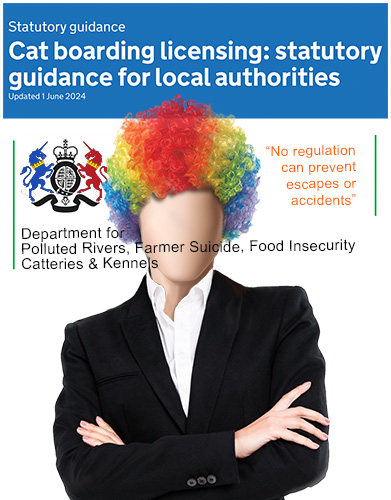Maybe the intention was to close down or drive older catteries out of business but DEFRA’s abysmally written regulations and the inconsistent interpretations by local authorities resulted in the destruction of a third of the country’s boarding capacity over 5 years.
In June 2024 another revised version was released that doesn’t address any of the fundamental problems - but while we’re waiting on the results of the September 2024 consultation, I think as a business sector we’re obliged to expose the inadequacies and insanity of the last iteration before the new version appears.

Part 1
If it’s a regulation it has to be universal, if it can’t be policed then it’s an advisory and there are no circumstances where there are two standards of animal welfare.
Prior to DEFRA’s involvement catteries had adopted FAB listing as the gold standard and the most universally accepted confirmation of cattery quality that in the public’s mind long outlasted the board itself.
When DEFRA took over the industry, they threw out decades of best practice and replaced it with an incoherent rating system that cannot be applied consistently and now runs to an incomprehensible 37 page print out … 37 pages that were written without any contact with anyone in our sector, without any practical knowledge of how catteries function and no legitimate source of advice.
Every boarding cattery is run differently and every cat is an individual and the only concern DEFRA had was taking over a private sector business, the imposition of faux homogeneity and a rating system that doesn’t work.
Every new cattery needs no more than 5 pages of central government rules and an A4 advisory on hygiene - However, it takes years to learn if you’re able to work 12 hour days 7 days a week, never get ill, take a break or go on holiday - and still manage to make hundreds of decisions a day through every possible permutation of sickness and travel delays without ever making a mistake for less than the minimum wage is beyond any bureaucrat’s imagination.
But it was through the imagination of bureaucrats that our sector ended up with regulations that are ill-conceived, badly written and neither universal or practical. And this gross abuse of power reimagined our industry by rewriting our regulations without any legitimate source of advice and without any consultation with our sector.
We ended up with instructions to create unnecessary paperwork, wasting resources, inefficiency, time-wasting, financial inputs that all reduced care time and animal welfare. Best practice was replaced by daily written wellness records on every door and scratching posts. We were forced into contracts with vets who are now all owned and run to maximise hedge fund manager profits rather than the animals they used to be responsible for. They forced minimum heating requirements and banned draughts when ventilation is more important. And they introduced a restaurant-style rating system that’s so inconsistently applied and so convoluted that it doesn’t represent or convey any useful information to the public.
DEFRA’s regulations discriminate against smaller catteries financially and financially disadvantage larger catteries through arbitrary staffing requirements. DEFRA have no idea of the length of training it requires to work unsupervised in a cattery but demanded useless qualifications because they didn’t have a better idea. DEFRA didn’t know that all work is seasonal and didn’t know that one person can properly run a 12 room cattery without help and there’s no more than 4 hours work a day available for ancillary staff even at high season in a large cattery. DEFRA discriminated against older builds and discriminated against more experienced owners because they eliminated experience as a factor of the rating system and DEFRA didn’t understand that experience is worth a thousand qualifications. DEFRA made it a condition of the licence for all staff to obtain ongoing and useless qualifications that includes part-time staff on what amounts to zero hour contracts. They discriminated against this entire sector because sub-standard and well run catteries were treated equally abysmally because every rule was open to interpretation, no time-scales for any remedial work was included and no guidance or clarification was provided to any local authority when it was requested and no appeals process was in place.
DEFRA’s astounding ignorance is best highlighted by the fact that they were not focussed on animal welfare or the practicalities of the sector but focussed on creating two standards that compromise animal welfare to support a restaurant style rating system that conveys nothing to anyone.
The rating system doesn’t need to be mischaracterised to show that it isn’t fit for any purpose.
For example; once a 5 star rating has been awarded there’s virtually no reason to inspect again since virtually nothing will ever reduce the rating, conversely a cattery adjudicated three stars has virtually no route to reach 5 stars. The only difference between 4 and 5 stars is that regardless of anyone’s qualification, background or experience a newly opened boarding cattery can only be rated 4 stars regardless of meeting every 5 star regulation. The only difference between 3 and 5 stars comes down to whether you want to leave the premises unattended to go shopping or to the gym whenever you like or for a 5 star rating you can choose never leave the premises unattended under DEFRA’s legally questionable permanent house arrest and enforced social deprivation regulation.
DEFRA were contacted by representatives of our sector because it had all gone wrong - but DEFRA didn’t want to accept responsibility, fix their mistakes or step aside - and DEFRA did none of what was required of them because ‘being responsive’, ‘public service’ and ‘accountability’ are things to avoid rather than adhere to. It was DEFRA’s delusional attitudes and unaccountable approach to their own failures, people’s livelihoods and the communities they serve that allowed 5 years to pass while a third of the country’s boarding capacity disappeared and many successful and professional businesses closed.
No one has been held to account.
DEFRA have failed the nation from their core responsibilities to their peripheral add ons - DEFRA’s endless foot-dragging and lack of moral or intellectual clarity ended up partially replacing a valued sector of UK industry with an unregulated alternative. DEFRA’s stated aims was to improve animal welfare and while the alarms were ringing, 5 years of inaction was a strategic failure and DEFRA are directly responsible for lowering the mean average quality of animal welfare across the entire country. And knowing this, DEFRA officials just slammed their heads into the sand and did nothing while a marginal and nascent cat-sitting and dog-walking sector grew exponentially driven by customer desperation continue to operate under the radar without insurance, training or inspections without overheads and guaranteed profits to fill the space created by DEFRA.
In June 2024 another pathetic revision of the rating system hit the shelves.
This “local authority statutory guidance” is an abuser’s charter masquerading as our industry regulations. And they’re still no more fit for purpose, concise or less open to abuse than the 2019 version. While all the glaring typos were fixed, the gross incompetence, ignorance, repetition, contradictory caveats, brainless confusion, stupidity and references to fish are still scattered throughout the pages - and the statutory guidance leaves room for the assumption that local authority employees are granted extraordinary and unlimited powers that give them the right to abuse their position, abuse business owners, deny licenses and close businesses down for minor or imaginary infractions and blame DEFRA for their mistakes.
This discussion of DEFRA's regulation fiasco is covered in ten short articles:
Part 1,
Part 2,
Part 3,
Part 4,
Part 5,
Part 6,
Part 7,
Part 8,
Part 9,
Part 10

